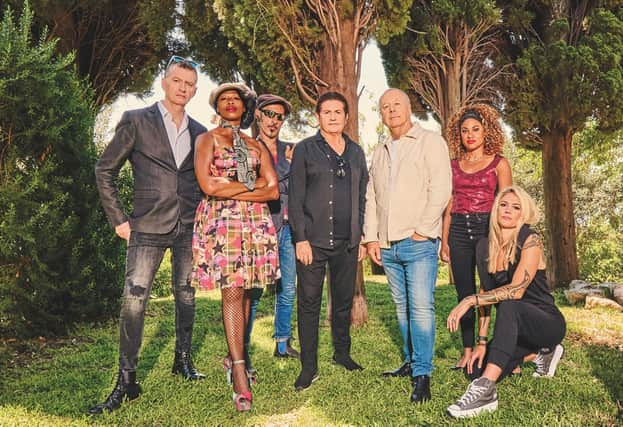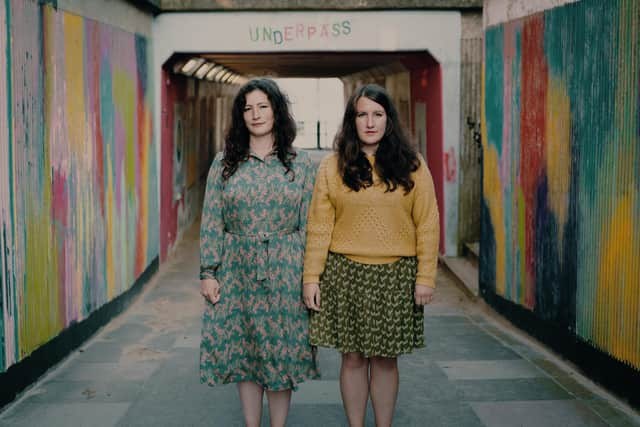Album reviews: Simple Minds | The Unthanks | Gun | A New International


Simple Minds: Direction of the Heart (BMG) ***
The Unthanks: Sorrows Away (Rabble Rouser Records) ****
Gun: The Calton Songs (Cherry Red Records) ***
A New International: Lost And Later Songs (Poum) ***
It was Mike Scott of The Waterboys who coined the term the Big Music for the sweeping, expansive sound he captured in the mid-Eighties, but it was Simple Minds who claimed it for the title of their 2014 album as a badge of their renaissance. It remains an apt description for most of their latest release, Direction of the Heart, which began life in Glasgow in 2019 and came to fruition in frontman Jim Kerr’s Sicilian hotel, closed to the public during the pandemic lockdowns.
This is no work of Covid claustrophobia, screaming to escape from an eerie Overlook Hotel, but an upbeat, extrovert dispatch from a band in their element, especially on the two singles which open the collection. The streamlined pop of Vision Thing is Kerr’s assured tribute to his late father, inspired by the last months he spent with him at home in Glasgow, while First You Jump advocates a step of faith in anxious times.
Advertisement
Hide AdAdvertisement
Hide AdHuman Traffic is a more mundane sketch of a tune, with Charlie Burchill far from stretched on guitar and even a guest appearance by Russell Mael of Sparks failing to hotwire the results.


Instead, inspiration strikes from way back, with the band resurrecting the song with which they opened their first ever gig in 1978. Act of Love was discarded by the band before it was ever recorded, but its turbo-charged Krautrock-influenced groove proves worthy of a reboot.
Finally, the band turn again to a kindred spirit, the late Michael Been of their Eighties US contemporaries The Call. Simple Minds covered his stirring Let the Day Begin on Big Music as if it were their own. The Walls Came Down is a similar pomp rock fit as Kerr, Burchill et al discover that its Reaganomics-inspired lyrics chime with the times 40 years on.
In recent years, The Unthanks have produced a tribute to Molly Drake, the soundtrack for the new Worzel Gummidge TV series and a concept album inspired by Emily Bronte. However, Sorrows Away is the first full ensemble album in seven years, featuring their distinctive chamber folk arrangements of songs from Orkney, Nova Scotia and their native Tyneside delivered in Rachel and Becky Unthank’s unmistakeable ravishing harmonic tones.
They capture Orcadian legend The Great Silkie of Sule Skerry like sun glinting off water, make light weather of the dark narrative in The Sandgate Dandlin Song, with mournful brass and delicate, undulating piano, and work their prog folk maximalist magic on the Bonnie Prince Charlie-inspired Scottish song The Royal Blackbird. The results are expansive and emotional, never more so than on the gently cathartic title track, a waltzing take on the folk standard Thousands and More.


Glasgow rockers Gun mark time before their next album of new material with The Calton Songs, a collection of acoustic renditions of their old school AOR favourites named after their Glasgow hood, which kicks off with a fully electric new song Backstreet Brothers and features some distinctly electric shredding on Steal Your Fire. Forgoing any fireside intimacy for sturdy productions, they frontload the album with their strongest songs, from the harmonica-fuelled rootsy country of Coming Home to the infectious Crazy You.
Fellow Glaswegians A New International have also had a lockdown clearout, dusting down songs dating back to their previous incarnation as The Starlets on this diverse double album, which spans the melodramatic flourishes of Loverboy, chiming synth pop of Ghost Light, wistful Weimar cabaret of Yesterday’s Already Light Years Away and a tender cover of The Associates’ Those First Impressions. Current single What Boys Do is a celebratory standout, combining the glam swagger of New York Dolls with a rollicking, Springsteenesque melody.
CLASSICAL
Advertisement
Hide AdAdvertisement
Hide AdBeau Soir: Debussy, Satie, Ravel & Poulenc (Delphian) ****
Delphian’s collaboration with the Young Classical Artists Trust (YCAT), which offers a recording platform to top-notch upcoming musicians, continues with this stimulating programme by Gdansk-born cellist Maciej Kułakowski and American pianist Jonathan Ware. It’s an inspired mix of genuine pieces for cello and piano – Sonatas by Debussy and Poulenc – and skilful arrangements of Satie, Ravel and Debussy. The flavour is exclusively French, the track list perfectly proportioned to offer palate-cleansing respite between the heavier courses. The Debussy and Poulenc sonatas are essentially the framework, the former combining poeticism and fortitude, the latter laced with essential quirkiness and humour. Ravel’s effervescent Sonata for violin and piano, with its bluesy central movement, loses nothing in Kułakowski’s delicate transcription. Dotted elsewhere, Debussy’s Beau Soir, Minstrels and La plus que lente, Satie’s Gnossiennes Nos 1-3 and Ravel’s Piéce en forme de habanera, all benefit from the excellent arrangements. Ken Walton
JAZZ
Marc van Vugt: The Lonely Coyote – Guitar Tales (Baixim Records) ****
This all-acoustic album from award-winning Dutch guitarist Marc van Vugt showcases his guitar collection as well as his musicianship: as he puts it in the sleeve notes, “every guitar tells a story”. Often associated with large ensemble projects, here he strips his music down to characterful solo or judiciously multi-tracked pieces. On the opening track, Bengggg, for instance, plangent notes bend like a Japanese shamisen lute as he combines 12-string guitar and harp zither. The title track may suggest twangy Americana, but that Lonely Coyote turns out to be a stealthily measured outing for baritone steel-string guitar reminiscent of Ralph Towner, while a milder-toned nylon-strung instrument double-tracks for the vivaciously Latin-sounding Chorineke. There’s glittering lyricism in Sunny Side Up, some atmospheric, electronically tweaked 12-string in Tea, while the perky No Worries signs off this intimate and frequently crystalline music. Jim Gilchrist